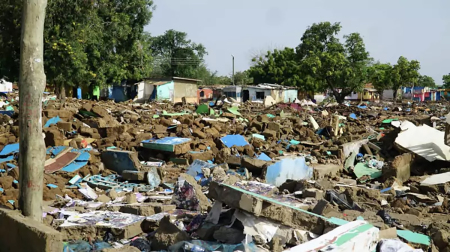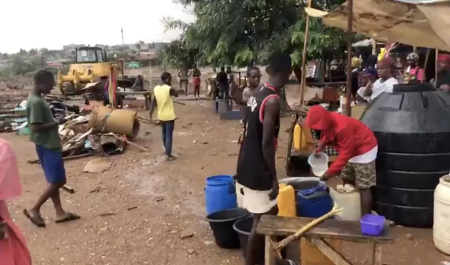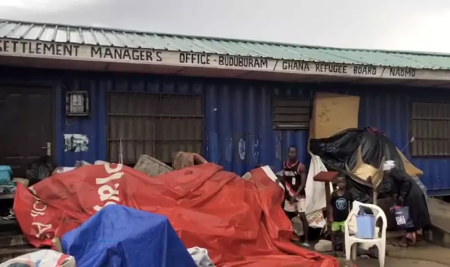Ghana demolition leaves over 6,000 Liberian refugees displaced, 65 churches looted, destroyed

Hundreds of Liberian refugees living in Ghana have been left destitute following the demolition of a section of a refugee camp, 28 miles (45 kilometers) outside of the country’s capital, Accra.
The Buduburam refugee camp has been home to Liberians for 35 years after thousands fled two brutal civil wars between 1989 and 2003.
Although the U.N. ruled that the refugees were safe to return home in 2006, many Liberians living in Ghana say they have no connection or relations with their home country and prefer to stay in Ghana.
Speaking to Christian Daily International, the president of the Liberian Community Leadership at the Buduburam Refugee camp, Dennis Yoko Gwion, said the U.N. recommendation for an option of refugee integration within the Ghanaian society in 2010 hasn't worked as planned due to what he termed as restrictions by the government.
“The Ghana Refugee Board gave us Liberian passports with resident permits which restricted us from working and doing business. We were promised that housing would be provided and that we would be relocated from Buduburam, but the Refugee Board has kept us here all this time,” said Gwion.
Gwion added that 6,168 registered individuals have been displaced as a result of the demolitions, which also included the destruction and looting of 65 churches.
“Most people are unwillingly opting to go back home because they have nowhere to stay. People are living in congested school buildings with no food, water and poor sanitation,” he said.

The refugees, who've been camping in nearby schools following the Feb. 27 demolition, are now at risk of being pushed to the streets after authorities gave notice to the affected refugees to vacate the schools. The demolition happened despite assurance from the chair of the Ghana Refugee Board, professor Kenneth Agyemang Attafuah, who said in comments at the UNHCR in Geneva in 2022 that the decommissioning of the refugee camp will be conducted in a “safe, humane and efficient manner consistent with domestic and international law and Ghana’s human rights obligations.”
The Executive Secretary of the Ghana Refugee Board, Tetteh Padie, was quoted last month as saying about 600 people were affected by the demolitions, including Liberians and Ghanians.
“Buduburam is no longer a refugee camp. We have several people living there who are not refugees. In fact, most of the people living there are not refugees, including the Liberians. Since the demolition, we’ve done some head counts and so far 268 persons who are refugees have come forward as having been affected,” said Padie.
The board is making arrangements for 231 documented refugees to be moved to another camp in the Western Region with the help of UNHCR, Padie added.
In his comments to CDI, Gwion refuted the refugee board’s account, sharing photos and video recordings of displaced people who he said would be sleeping on the streets with little to no access to water and food.

The International Society for Human Rights (ISHR), whose leadership recently visited the site, announced an emergency webinar to highlight the plight of the refugees and mobilize the much needed aid in the face of what ISHR terms as a “dire situation.”
“As the situation deteriorates, the camp coordinator has issued a distressing message: our food reserves are rapidly depleting, and medical conditions are escalating. We cannot sit idly by as our fellow human beings suffer,” the ISHR said in a statement.
ISHR Secretary General Matthias Boehning emphasized the need for the people of Buduburam refugee camp to be successfully integrated into Ghanaian society.
“The Ghanaian government must follow up its words in Geneva with action. The ISHR will continue to work to ensure that the fate of the people in the Buduburam refugee camp is not forgotten and that real solutions are created,” noted Boehning.
Liberian President Joseph Nyuma Boakai also weighed in on the demolition and suggested the eviction of the refugees was linked to a land ownership tussle.
“It is the understanding of the president that the current activities [are] taking place under the auspices of the Gomoa-Fetteh Traditional Council, who are believed to be the owners of the land hosting the Buduburam Camp,” said the President in a statement published on his social media.
Boakai urged the Ghanaian government to intervene and ensure that the refugees living in the camp are “safe, protected and treated humanely.”
Originally published at Christian Daily International
Christian Daily International provides biblical, factual and personal news, stories and perspectives from every region, focusing on religious freedom, holistic mission and other issues relevant for the global Church today.





















